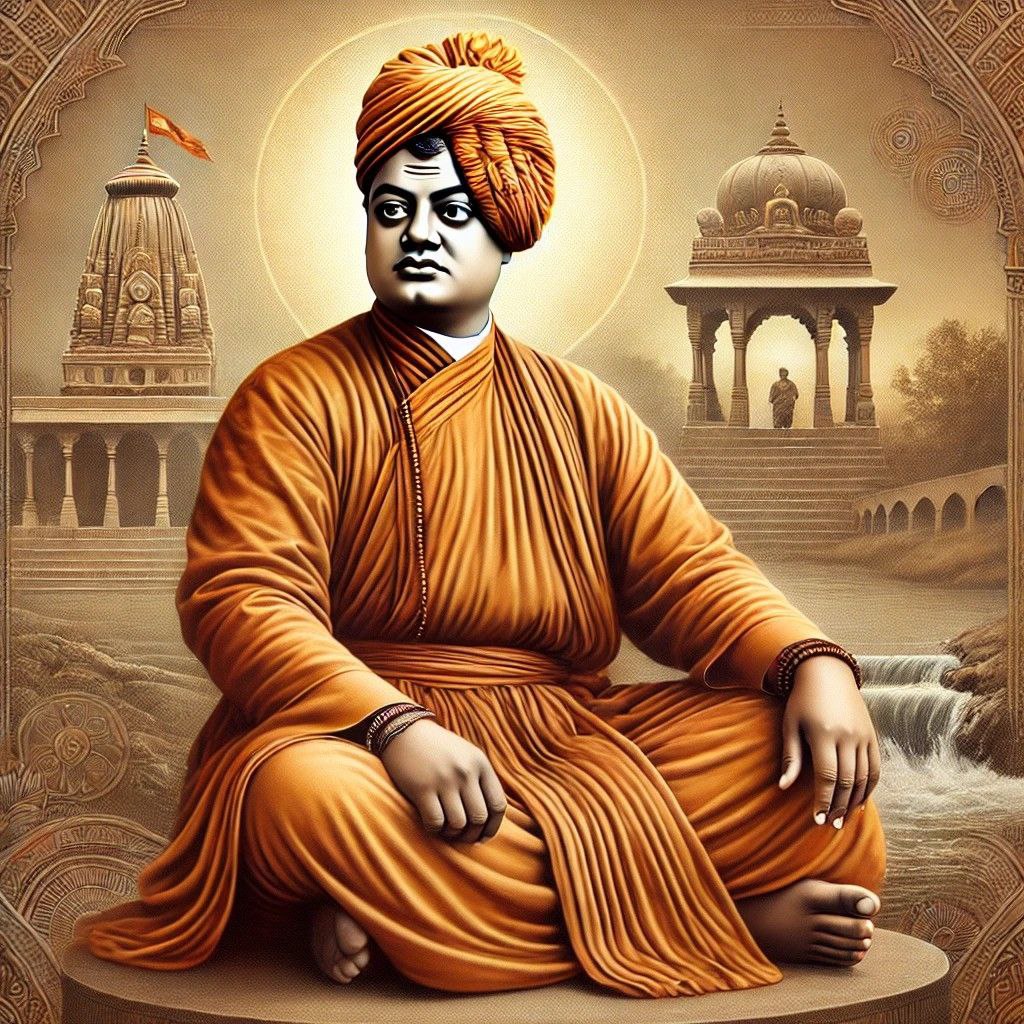Swami Vivekananda (1863–1902) was a prominent Indian philosopher, spiritual leader, and social reformer who played a pivotal role in the revival of Hinduism and its global recognition. Born as Narendranath Datta in Kolkata, Vivekananda was a brilliant student with a keen interest in philosophy, spirituality, and social reform. He became a disciple of Sri Ramakrishna Paramahamsa, whose teachings of universal love, tolerance, and the unity of all religions deeply influenced him.
Vivekananda is best known for his historic speech at the Parliament of the World’s Religions in Chicago in 1893, where he addressed the audience as “Sisters and Brothers of America,” earning a standing ovation. His speech highlighted the essence of Hindu philosophy, advocating for religious harmony, mutual respect, and the universality of spiritual truths.
As the founder of the Ramakrishna Mission and Math, Vivekananda worked tirelessly for the upliftment of the poor, education, and the promotion of social equality. His teachings emphasized self-confidence, service to humanity as service to God, and the empowerment of the youth.
Vivekananda’s writings and speeches continue to inspire people worldwide, encouraging the pursuit of a balanced life that combines spiritual wisdom and active engagement with societal challenges. He is celebrated as one of India’s greatest spiritual leaders and a key figure in the Indian Renaissance.
Here’s an analysis of his views on ideal society, humanism, and nationalism:
Ideal Society
Vivekananda envisioned a society that balanced spiritual values with material progress and emphasized unity, equality, and moral integrity.
- Equality and Inclusivity:
- Advocated for the removal of caste-based discrimination and untouchability.
- Championed women’s empowerment and equal opportunities for all genders.
- Believed that society could progress only when the downtrodden masses were uplifted.
- Spiritual Foundation:
- Emphasized that an ideal society should be built on spiritual and ethical values, with selflessness, compassion, and service at its core.
- Criticized materialism and greed, advocating instead for a balance between material and spiritual well-being.
- Education for All:
- Saw education as the cornerstone of an ideal society.
- Advocated for a holistic approach to education that combined character-building, intellectual development, and practical skills.
- His famous quote: “Education is the manifestation of the perfection already in man.”
- Synthesis of Cultures:
- Believed in the harmonious blending of Eastern spirituality and Western material progress.
- Envisioned a society where the best aspects of all cultures coexisted for the greater good.
Humanism
Vivekananda’s philosophy was deeply humanistic, emphasizing the dignity, potential, and interconnectedness of all individuals.
- Service to Humanity:
- Declared that serving humanity was the highest form of worship: “Jiva is Shiva”—every living being is divine.
- Advocated for social service as a spiritual duty, encouraging his followers to work for the poor, sick, and oppressed.
- Upliftment of the Marginalized:
- Urged reformers to prioritize the welfare of the poor and underprivileged.
- Criticized the neglect of the masses by the elite and worked to bridge this divide through education and empowerment.
- Universal Brotherhood:
- His address at the World’s Parliament of Religions in Chicago (1893) reflected his belief in the inherent unity of humanity.
- Opposed religious exclusivism, advocating for mutual respect and dialogue among faiths.
- Empowerment through Self-Realization:
- Believed that understanding one’s inner divinity and potential was key to self-empowerment and societal transformation.
- Saw the individual as central to the progress of humanity.
Nationalism
Vivekananda was a pioneer of modern Indian nationalism, inspiring Indians to take pride in their heritage and work for the nation’s regeneration.
- Spiritual Nationalism:
- Rooted his vision of nationalism in India’s spiritual traditions and cultural heritage.
- Urged Indians to awaken their inner strength and self-respect, declaring that India had a unique role in spreading spirituality to the world.
- Youth as the Pillars of the Nation:
- Encouraged the youth to take an active role in nation-building, emphasizing physical strength, moral courage, and intellectual vigor.
- His famous call: “Arise, awake, and stop not till the goal is reached!”
- National Unity:
- Advocated for the unity of India across divisions of caste, religion, and region.
- Saw religion as a unifying force, not a divisive one, emphasizing the common spiritual underpinnings of Indian society.
- Economic and Social Empowerment:
- Stressed the importance of self-reliance and economic upliftment for national regeneration.
- Supported vocational training and skill development to address poverty and unemployment.
- Global Vision:
- Believed that Indian nationalism was not insular but had a universal dimension, contributing to the spiritual and moral upliftment of humanity.
Legacy
Swami Vivekananda’s ideals of an inclusive society, rooted in spiritual humanism and powered by a sense of national pride, continue to resonate. His ( Swami Vivekananda ) vision transcended his time, inspiring leaders like Mahatma Gandhi, Rabindranath Tagore, and Subhas Chandra Bose, and influencing India’s struggle for independence and beyond. His message of unity, service, and self-confidence remains a guiding light for building a just and progressive world.

